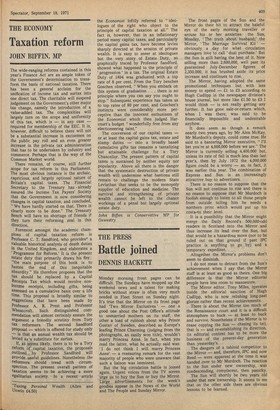THE ECONOMY
Taxation reform
JOHN BIFFIN, MP
The wide-ranging reforms contained in this year's Finance Act are an ample token of the Government's determination to transform the basis of national taxation. There has been a general acclaim for the unification of income tax and surtax into one direct tax. The charitable will suspend judgement on the Government's other major tax change, namely the introduction of a value-added tax. The complexities will largely turn on the scope and uniformity of this tax, which is — in any case — required for membership of the EEC. It is, however, difficult to believe there will not be a substantial increase in excisemen on the public pay roll and an even greater increase in the private tax administration that has to be undertaken by industry and commerce. Perhaps that is the way of the Common Market world.
There remains, of course, still further scope for tax reform in this Parliament. The most obvious instance is the archaic, capricious, and largely optional nature of Britain's capital taxes. The Financial Secretary to the Treasury has • already assured the Income Tax Payers' Society that the Government is now considering changes in capital taxation, and concluded, "We have hardly started on that. There is clearly more to be done." The Treasury Bench will have no shortage of friends if they turn their reforming zeal in this direction.
Foremost amongst the academic champions of capital taxation reform is Professor C. T. Sandford, who provides* a valuable historical analysis of death duties in the United Kingdom, and elaborates a ' Programme for Reform.' It is the present estate duty that primarily draws his fire :
the main purpose of this book is to hasten the end of this inequitable absurdity." He therefore proposes that the tax should be replaced by a Capital Receipts Tax which would involve nonincome receipts, including gifts, being assessed on a cumulative basis over a life time. This proposal is broadly similar to suggestions that have been made by Professor A. R. Prest and Professor Wheatcroft. Such distinguished commendation will almost certainly ensure the argument a friendly scrutiny from Tory tax reformers. The second Sandford Proposal — which is offered for study only — is that an annual wealth tax should be levied as a substitute for surtax.
If, as sOms likely, there is to be a Tory reform Of capital taxation, the proposals outlined by Professor Sandford will Provide i.iseful guidelines. Nonetheless the reformers should tread with circumspection. The present overall pattern of taxation seems to be achieving a more egalitarian society. In a recent article the Economist loftily referred to " ideologues of the right who object to the principle of capital taxation at all." The fact is, however, that in an inflationary period many capital taxes, and particularly the capital gains tax, have become levies sharply directed at the erosion of private wealth. It is easy to sneer at ideologues but the very story of Estate Duty, so graphically traced by Professor Sandford, showed what happened to the principle of ' progression ' in a tax. The original Estate Duty of 1894 was graduated with a top rate of 8 per cent. From the Tory benches Goschen observed, "When you embark on this system of graduation . . . there is no principle where you can say you ought to stop." Subsequent experience has taken us to top rates of 80 per cent, and Goschen's instincts were considerably more perceptive than the innocent enthusiasm of the Economist which then judged Harcourt's budget "wonderfully free from any electioneering taint."
The conversion of our capital taxes — or at least the capital gains tax, estate and stamp duties — into a broadly based cumulative gifts tax remains a tantalizing but attainable challenge for a Tory Chancellor. The present pattern of capital taxes is sustained by neither equity nor popularity. Above all there is the danger that the systematic destruction of private wealth will undermine what bastions still remain to challenge the modern State Leviathan that seeks to be the monopoly supplier of education and medicine. The survival and strengthening of private wealth cannot be left to the chance workings of a penal but largely optional estate duty.
John Biffen is Conservative MP for Oswestry


































 Previous page
Previous page